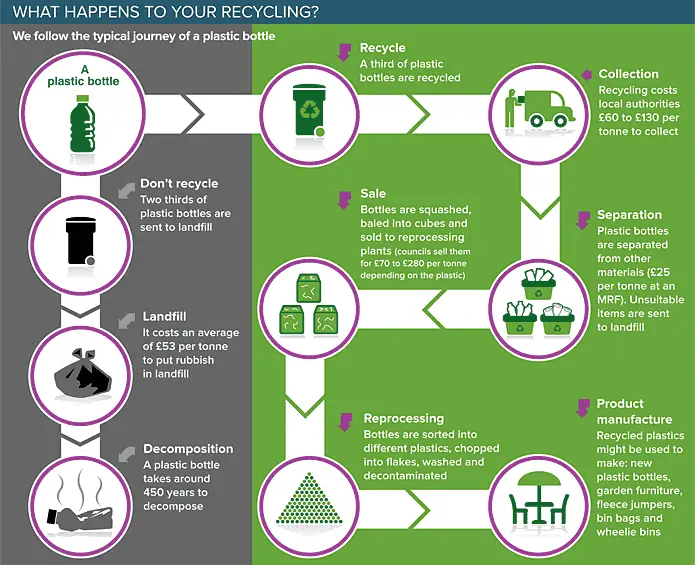Plastic Recycling
In a society that is becoming more and more conscientious about their environment and the negative effects that certain materials have on the Earth, recycling is becoming the norm. Plastics are especially harmful to the environment and recycling them is becoming a top priority. Many people believe that the advantages of plastic recycling far outweigh the disadvantages. The advantages do make recycling plastic ideal. However, with anything, the disadvantages must be weighed also!

Advantages of Plastic Recycling
Below are some of the major advantages of plastic recycling.
- Energy and Natural Resources are Conserved: When plastics are recycled the amount of energy and natural resources needed to create new plastic is greatly reduced. Plastic production makes up about four percent of the energy consumed in the U.S. and about 70 percent of the plastics made in the U.S. are made from domestic natural gas.
- Plastic Recycling Conserves Landfill Space: Landfills in the U.S. are becoming overwhelmingly crowded. The U.S. is looking for alternatives to landfills and trying to find places for additional landfills. Recycling is beginning to take a little bit of the burden off of the landfills and allows for plastics to be reused in making new products.
- Plastic Recycling is Pretty Easy: There are plastic recycling programs across the U.S. and about 80 percent of all Americans are able to access a recycling program easily. Many municipalities offer curbside pick-up of recyclables, including plastics. There are several hundred businesses that handle plastics for recycling. Many of the grocery stores now offer recycling collection of the plastic bags that are used along with plastic wrap.
Disadvantages of Plastic Recycling
There are also some disadvantages of plastic recycling which are described in brief below.
- Impact on the Environment: Every piece of recycled plastic can be a potential threat to the environment. The recycling method for plastics produces volatile organic compounds, or VOC. These fumes can be very harmful to plants and animals near the recycling plant. If it is harmful to animals and plants, doesn’t that mean that it is also potentially harmful to humans? The high amount of heat needed to melt plastics will generate carbon emissions and those contribute to global warming.
- Health Issues: As mentioned above, the VOCs that are emitted can present severe health threats to people who come into contact with the recycled plastics. Plastic resin comes from petroleum and can leech into foods that are stored in containers made from plastic resin. Plastic resin is a part of the manufacturing and recycling process of plastics. Plastics are not cited by the U.S. Food and Drug Administration as a major health threat since only a small amount of recycled plastic is used when producing food containers and packaging. But the amount of chemicals that uses consume can increase depending on the type of plastic, the age of the plastic and the temperature, like when heating in the microwave.
- Down-cycling: Much of the plastics being recycled are actually being down-cycled. This is when the plastic is broken down and used as a different and less useful product instead of a new container. Down-cycled plastics may be used as artificial turf or plastic furniture. Therefore there is a lot of waste produced when down-cycling.
Recycling is a good concept and for materials such as paper and glass, the advantages far outweigh the disadvantages. When recycling plastics, though, the environment can be harmed further by the recycling process. Safer recycling practices for plastics need to be created.

